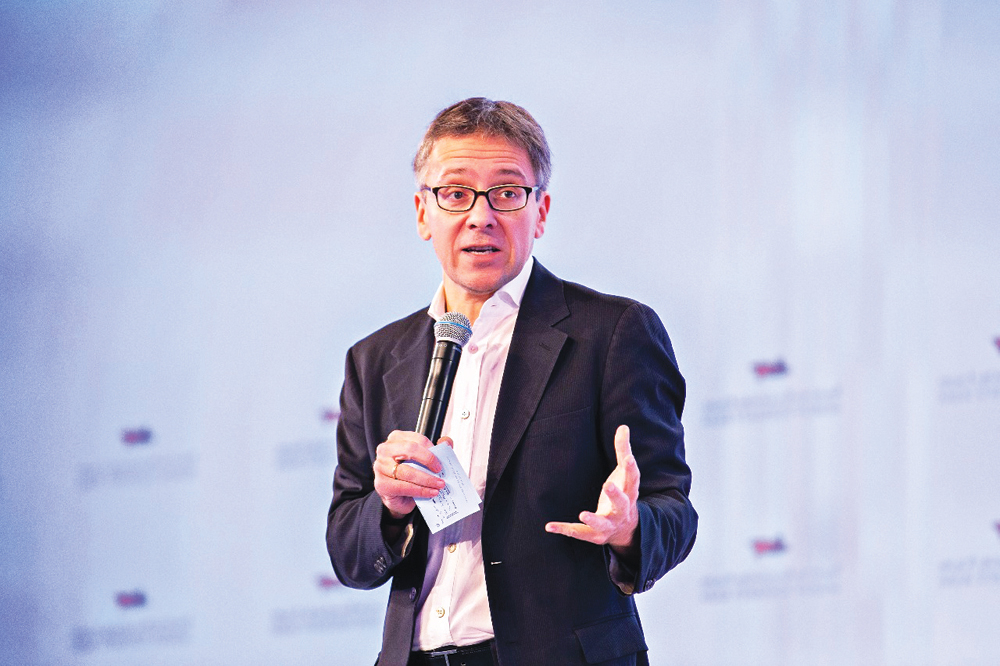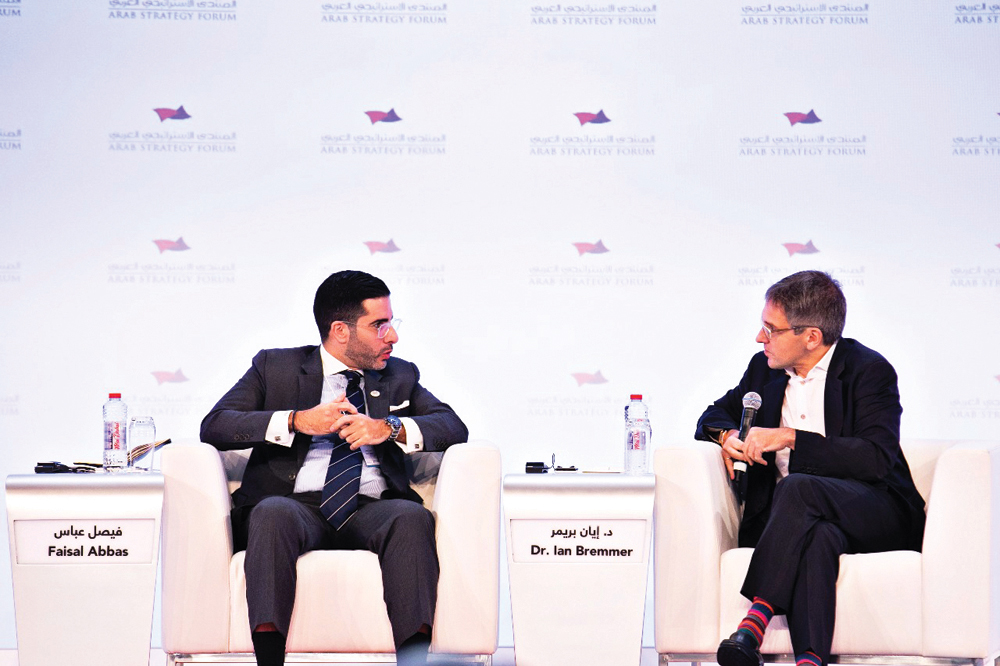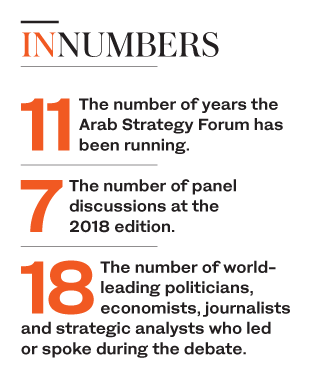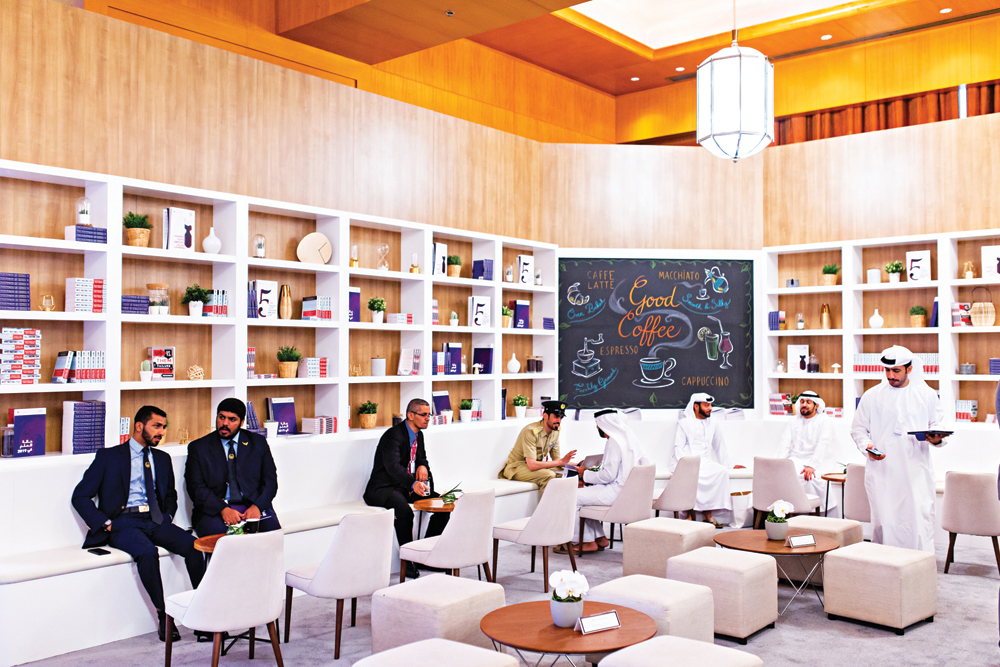Saudi Arabia will remain the strongest ally of the US in the Middle East and lies at the “heart and core” of President Trump’s foreign policy, some of the world’s leading politicians, economists and strategic analysts heard as they gathered to forecast the geopolitical state of the world in 2019.
At the 11th Arab Strategy Forum, an annual gathering to discuss worldwide political, economic, security and social scenarios and plan ways to help the region prepare for future challenges, speakers talked about a steadfast bond between the US and Saudi over the next 12 months. They said that Trump views the Kingdom as an unshakable ally with common regional interests including America’s fight against Iran, the peace process in the Israeli-Palestinian conflict and a turbulent and fluctuating oil market.
“The Trump administration has been fighting very hard to move beyond Jamal Khashoggi,” said Fawaz Gerges, professor of international relations at the London School of Economics, who joined Ambassador Dennis Ross, former assistant to President Obama and National Security Council senior director for the Central Region, and Bernardino Leon, director general of the Emirates Diplomatic Academy, in a panel discussion titled the “State of the World Politics in 2019.”
“They have made it very clear that they want to focus on other interests; the Israel-Palestine peace process, the question of Iran, the oil market … President Trump has made it very clear that Saudi Arabia really lies at the heart and the core of his foreign policy.”
He said that despite “tremendous pressures to take further steps” against the Kingdom, “the reality so far seems to be that the president will not listen to the critics.”

Dr. Ian Bremmer, president and founder of Eurasia.
He said that although the relationship between the US and Saudi Arabia has come under strain, “as long as Donald Trump remains in power the relationships will continue to stay.”
In the panel discussion, moderated by CNN’s Becky Anderson, Leon also addressed Saudi and US relations.
“There are two dimensions; one is internal US politics, the other is in terms of foreign policy. Foreign policy has to be determined by the government and will continue to be determined by the government — this is the rule. So if you see these relations, in historical terms Saudi Arabia has always been the main ally in the region for the United States.
“This is a region where another traditional very strong ally, Turkey, is now in a different position and even though we are at a time where this region is probably experiencing more difficulties than ever before, the United States will continue to act on that basis. I do not expect big changes. I am sure we there will be waves and I am sure the US Congress will call for more transparency and more information after what happened after Khashoggi, probably this is going to happen. But there will be no structural changes.”
Ross said that US policy — which states that if the president vetoes a decision, Congress may override the veto by a two-thirds supermajority of both houses — means it would be “very difficult” for Congress to overturn any decision on sanctions against the Kingdom that Trump, who has been vocal in his continuing support and relations with Saudi Arabia. He added that “most of the pressure” from federal government would be more likely to be dominated by the ongoing Trump-Russia investigations.

Faisal Abbas, editor in chief of Arab News, left, in conversation with Dr. Ian Bremmer.
After being addressed by Faisal Abbas, editor in chief of Arab News, who posed a question about US-Middle East relations and asked if the US would distance itself from the Arab world, Ross said that the US would continue to have a vested interest in Middle Eastern activities.
“Las Vegas rules do not apply to the Middle East, what takes place in the Middle East doesn’t stay in the Middle East. That is ultimately why we have to stay involved in it.”
Abbas began the first panel discussion of the day, “Discussing Megatrends in 2019,” by questioning speaker Dr. Ian Bremmer, president and founder of Eurasia, about oil prices, Saudi Arabia’s international and regional relations and his predictions for the year ahead.
Bremmer addressed the recent announcement by Qatar that it was withdrawing from the oil exporters’ group OPEC, saying the move would have little impact or fallout.
“Qatar in OPEC is a marginal player so I do not think their leaving is significant.”
Bremmer said that Qatar attended the Gulf Cooperation Council’s (GCC) annual summit in Riyadh this week and that Qataris and Saudis “directly engaged” was a move to be looked at in a “positive” way.
 At the forum, attended by Dubai ruler Sheikh Mohammed bin Rashid Al-Maktoum, Bremmer began his address by saying that 2019 should not see any real turbulent crisis, and highlighted the “good news” of “robust” predictions laid out by the International Monetary Fund that state the global economy will grow 3.7 percent this year.
At the forum, attended by Dubai ruler Sheikh Mohammed bin Rashid Al-Maktoum, Bremmer began his address by saying that 2019 should not see any real turbulent crisis, and highlighted the “good news” of “robust” predictions laid out by the International Monetary Fund that state the global economy will grow 3.7 percent this year.
However, he said that 2020 is likely to witness another recession and warned — unlike the shows of unity after the 2008/09 financial crisis — of a fractious and “dysfunctional” geopolitical landscape that will mean the world will be unlikely to be able to bounce back easily.
“The good news is the 2019 economy will not be horrible. The bad news; the next economic downturn will be much worse. My worry is that whenever the next downturn comes we have a problem. The thing about the last major recession … which was a big one, is the response from all the world’s major economies. They all worked together in saying we have a problem, we need to get out of this together.
“Whenever the next downturn happens — which economists say is 2020 — when it comes the political reaction it is not going to be like 2008/9.”
Instead, the world is likely to witness a “blame-game” with countries pointing the finger at one another. Bremmer warned: “This is the most fraught geopolitical period in my lifetime … and the dysfunction is only going to grow.”
The geopolitical landscape has been heightened by a series of world events, including the “disastrous” negations over Brexit, France’s “yellow vest” protests, the looming end to Chancellor Angela Merkel’s reign, the state of US-China relations and the recent US sanctions on Iran.
Bremmer also raised concern over cybercrime and the shadow economy. He said that three of his biggest concerns from 2018 were North Korea-linked hackers stealing millions from ATMs across the world, Russian hackers using antivirus software to steal US cyber capabilities to attack Ukraine’s online network and the accounts of millions of Chinese web users being compromised in a series of hacks.
At the forum, speakers also discussed mega-trends and forecast the future of economics and government policies in the region.
 The role of Iran as a leading state sponsor of terror and the impact of US sanctions was a factor among many of the key discussions. Ross said: “The interesting thing with Iran in 2019 is to see how they will tackle the internal pressure internally due to there economic decline,” while Bremmer said it was likely that Tehran would seek to wait out the Trump administration.
The role of Iran as a leading state sponsor of terror and the impact of US sanctions was a factor among many of the key discussions. Ross said: “The interesting thing with Iran in 2019 is to see how they will tackle the internal pressure internally due to there economic decline,” while Bremmer said it was likely that Tehran would seek to wait out the Trump administration.
The growing role of China also dominated discussions. Leon said: “The US and China are two heavyweights that will keep their battle going on but it will not need to escalate much more, due to the nature of global economic markets,” while speakers highlighted the “winding down” of the war in Yemen as a positive trend in 2019.
In the “State of the Arab World Economy in 2019,” Dr. Nasser Saidi, former Lebanese minister of economy and trade, and Dr. Mahmoud Mohieldin, senior vice president of the World Bank Group, said that there was a general consensus that the economic recession would most likely start in 2019 and predicted an era of “turbulence” over the next 12 months, including a ripple effect across the GCC caused by oil price fluctuations.
At the same panel discussion, H.E Nasser Judeh, former deputy prime minister of foreign affairs of Jordan, Dr. Ayad Allawi, former prime minister of Iraq and the leader of the National Accord, and H.E Nabil Fahmy, former foreign minister of Egypt, deliberated on the regional landscape over the next 12 months, with Allawi warning that the region is a “fertile ground” for terrorist groups should it not stabilize and not implement reforms that the Arab world is in “dire need of.”
Fahmy addressed Qatar relations, saying that while a fragmented Arab world comes at the expense of every country, he was “not optimistic for radical change” in Qatar’s policies and said that the GCC could not back down to a country that refuses to “change its internal methodology.”
“Qatar has to be a player — not an adversary.”
Ahead of the forum, Mohammed Al-Gergawi, minister of Cabinet Affairs and the Future, and chairman of the organizing committee, said the Arab Strategy Forum was launched as a platform for balanced analysis by decision-makers to offer a clearer understanding of the economic and political outlook for the Arab region and the world.





























